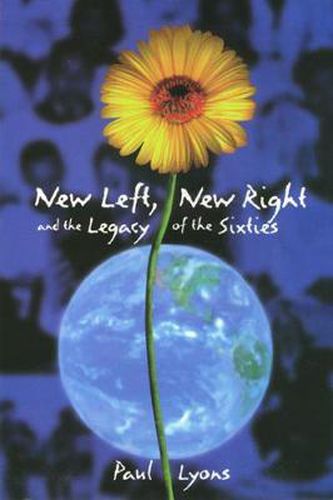Readings Newsletter
Become a Readings Member to make your shopping experience even easier.
Sign in or sign up for free!
You’re not far away from qualifying for FREE standard shipping within Australia
You’ve qualified for FREE standard shipping within Australia
The cart is loading…






Paul Lyons closely examines two equally important movements of the early sixties, the New Left and the New Right, both sides equally critical of existing society and both utopian in their visions, and describes the ways in which the historical reality of the sixties has been dramatically distorted by popular political and social images. New Left, New Right, and the Legacy of the Sixties points to the oversimplification of this generation–not only were there those who served and those who protested, but those who did neither, the silent majority, a group often overlooked but deeply affected. Examining the careers of such conservative figures as William F. Buckley, Jr., Barry Goldwater, and David Keene, Lyons demonstrates that while the New Left was rallying in the streets, the New Right was building a platform of its own, one that would enable the movement to take center stage by the eighties with the election of Ronald Reagan. This book also points to other fallacies like the exaggerated rightward turn that occurred as the sixties receded, and the misuse of the term yuppie. Lyons examines this term and explains that while it originally defined a group of young, upwardly mobile professionals in relationship to electoral politics, it became a word used to describe patterns of consumption and lifestyle. The author asserts that the road to understanding this term’s significance also reveals the ways in which social issues have permeated our political culture. Lyons concludes that despite all of the progress initiated by the political momentum of the sixties, we as Americans are still plagued by debates about issues like multiculturalism, Afrocentrism, and affirmative action, and in order to effectively address these issues today, we must acknowledge and accept the contributions made by both movements. Author note: Paul Lyons is professor in the Social and Behavioral Sciences Division at Stockton College, Pamona, New Jersey.
$9.00 standard shipping within Australia
FREE standard shipping within Australia for orders over $100.00
Express & International shipping calculated at checkout
Paul Lyons closely examines two equally important movements of the early sixties, the New Left and the New Right, both sides equally critical of existing society and both utopian in their visions, and describes the ways in which the historical reality of the sixties has been dramatically distorted by popular political and social images. New Left, New Right, and the Legacy of the Sixties points to the oversimplification of this generation–not only were there those who served and those who protested, but those who did neither, the silent majority, a group often overlooked but deeply affected. Examining the careers of such conservative figures as William F. Buckley, Jr., Barry Goldwater, and David Keene, Lyons demonstrates that while the New Left was rallying in the streets, the New Right was building a platform of its own, one that would enable the movement to take center stage by the eighties with the election of Ronald Reagan. This book also points to other fallacies like the exaggerated rightward turn that occurred as the sixties receded, and the misuse of the term yuppie. Lyons examines this term and explains that while it originally defined a group of young, upwardly mobile professionals in relationship to electoral politics, it became a word used to describe patterns of consumption and lifestyle. The author asserts that the road to understanding this term’s significance also reveals the ways in which social issues have permeated our political culture. Lyons concludes that despite all of the progress initiated by the political momentum of the sixties, we as Americans are still plagued by debates about issues like multiculturalism, Afrocentrism, and affirmative action, and in order to effectively address these issues today, we must acknowledge and accept the contributions made by both movements. Author note: Paul Lyons is professor in the Social and Behavioral Sciences Division at Stockton College, Pamona, New Jersey.